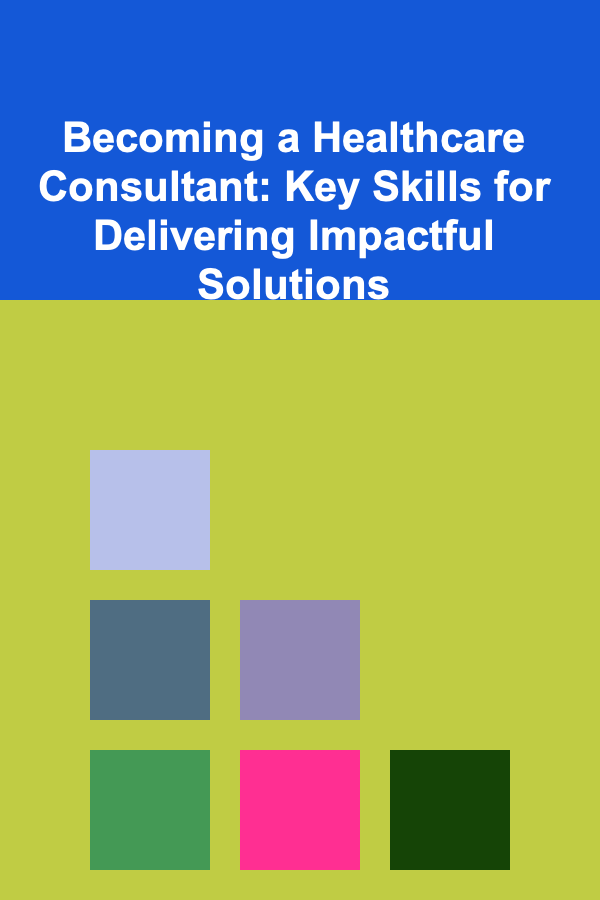
Becoming a Healthcare Consultant: Key Skills for Delivering Impactful Solutions
ebook include PDF & Audio bundle (Micro Guide)
$12.99$10.99
Limited Time Offer! Order within the next:

The healthcare industry is one of the most dynamic, complex, and rapidly evolving sectors in the world. As a result, healthcare organizations are constantly seeking experts who can provide tailored solutions to improve efficiency, patient care, and overall performance. Healthcare consultants play a vital role in this process, offering insights and strategies that help organizations navigate the challenges they face. However, becoming an effective healthcare consultant requires more than just technical expertise or industry knowledge. It demands a diverse skill set, the ability to think critically, and a deep understanding of the healthcare ecosystem.
This guide will explore the key skills required to become a successful healthcare consultant and provide actionable insights for delivering impactful solutions.
Deep Industry Knowledge and Understanding
The foundation of any healthcare consultant's career is a thorough understanding of the healthcare system, including its structure, regulations, and challenges. A healthcare consultant must be well-versed in both the operational and clinical aspects of healthcare to offer meaningful advice.
Actionable Strategy:
- Stay Informed on Healthcare Trends: Subscribe to industry journals, attend conferences, and engage in continuous learning. Healthcare is an ever-changing landscape, with new technologies, regulations, and patient care models emerging regularly. Being well-versed in the latest developments will allow you to offer up-to-date and relevant advice.
- Understand the Regulatory Environment: Healthcare consultants must be familiar with healthcare laws, regulations, and compliance standards, such as HIPAA in the United States, GDPR in the EU, or other local frameworks. Having a clear understanding of these regulations ensures that your recommendations align with legal and ethical standards.
- Gain Specialized Knowledge: Whether it's the intricacies of hospital operations, patient care delivery models, or the integration of new technologies like AI in healthcare, specialized knowledge in specific healthcare niches can make you stand out as a consultant.
Critical Thinking and Problem-Solving
Healthcare organizations often come to consultants because they face complex challenges that require innovative solutions. A consultant's ability to think critically and analyze problems from multiple angles is essential to providing impactful recommendations.
Actionable Strategy:
- Adopt a Systematic Approach: When confronted with a problem, break it down into smaller, manageable components. Identify the root cause of the issue and assess all contributing factors before proposing solutions.
- Use Data Analytics: Leverage data to support decision-making. By using analytics tools and methodologies, consultants can identify patterns, trends, and gaps in healthcare services or operational processes, allowing for data-driven solutions.
- Challenge Assumptions: Never accept the status quo without questioning it. A good consultant will ask why things are done a certain way and whether there is a more effective or efficient approach.
Strong Communication and Interpersonal Skills
Effective communication is crucial for any consultant, but it's especially important in healthcare, where miscommunication can have serious consequences. Whether you're presenting a report to hospital executives, collaborating with clinical staff, or leading a workshop, being able to communicate clearly and persuasively is essential.
Actionable Strategy:
- Tailor Communication to Your Audience: Healthcare organizations consist of diverse stakeholders, including clinicians, administrators, and support staff. Tailor your language and messaging to the audience, ensuring that it resonates with their specific interests and concerns.
- Practice Active Listening: A successful consultant listens more than they speak. By actively listening to clients and stakeholders, you can uncover the true nature of the challenges they face and gain valuable insights that may not be immediately obvious.
- Use Clear Visuals: When presenting complex data or solutions, use visuals like charts, graphs, and flow diagrams. These tools can help convey complex information more clearly and make it easier for stakeholders to grasp key insights.
Project Management and Organizational Skills
Healthcare projects often involve multiple stakeholders, tight deadlines, and a variety of tasks that need to be managed simultaneously. Effective project management is therefore a crucial skill for healthcare consultants, enabling them to deliver solutions on time and within budget.
Actionable Strategy:
- Develop a Clear Project Plan: Start by defining the project scope, goals, and deliverables. Create a detailed project timeline, outlining key milestones and deadlines. Use project management tools such as Trello, Asana, or Microsoft Project to keep track of tasks and deadlines.
- Manage Stakeholder Expectations: Regularly update stakeholders on the project's progress, and manage their expectations regarding timelines, deliverables, and challenges. Proactive communication is key to keeping everyone aligned.
- Adaptability: Healthcare environments are often unpredictable. Being flexible and adapting to unforeseen changes in the project landscape is crucial for maintaining progress. Whether it's budget changes, shifting regulations, or new technology, being prepared for change can help you stay on track.
Analytical Skills and Ability to Work with Data
Healthcare consultants must be comfortable working with a wide range of data. From analyzing patient outcomes and operational performance to evaluating financial reports, data is a powerful tool that informs decision-making. An analytical mindset will enable consultants to extract actionable insights from complex data sets.
Actionable Strategy:
- Master Data Tools: Familiarize yourself with tools like Microsoft Excel, Tableau, and healthcare-specific analytics platforms. These tools will help you analyze large datasets and generate reports that provide valuable insights for your clients.
- Learn Data Interpretation: It's not enough to simply collect data; you must be able to interpret it meaningfully. Understand the metrics that matter most to your client's goals (e.g., patient satisfaction, readmission rates, operational efficiency) and focus on those in your analysis.
- Develop Key Performance Indicators (KPIs): Help healthcare organizations develop and track KPIs that are tied to their strategic goals. These KPIs will serve as a benchmark for measuring the success of your proposed solutions.
Healthcare Technology Knowledge
As healthcare systems become increasingly digitized, consultants must understand how technology can be integrated into healthcare delivery. From electronic health records (EHR) systems to telemedicine platforms and AI-powered diagnostics, technology is transforming healthcare at every level.
Actionable Strategy:
- Stay Updated on Emerging Technologies: Invest time in learning about the latest technological advancements in healthcare. Technologies like AI, machine learning, telemedicine, and robotics are all revolutionizing patient care and operational efficiency.
- Understand Integration Challenges: Technology integration can be complex. Understand the challenges healthcare organizations face when adopting new technologies, such as system compatibility issues, staff training, and workflow adjustments.
- Advocate for Data Security: As healthcare organizations handle sensitive patient information, cybersecurity is a major concern. Be prepared to advise clients on best practices for protecting patient data and complying with privacy regulations.
Change Management Expertise
Implementing change in healthcare organizations is challenging, especially when it involves shifting organizational culture, altering workflows, or adopting new technologies. A healthcare consultant must be skilled in change management to ensure that any changes are smoothly implemented and well-received by the team.
Actionable Strategy:
- Understand the Stages of Change: Familiarize yourself with change management frameworks, such as the ADKAR model (Awareness, Desire, Knowledge, Ability, Reinforcement). Use these models to guide the planning and implementation of change initiatives.
- Communicate the Benefits: When proposing change, make sure stakeholders understand the benefits. Whether it's improving patient care, increasing efficiency, or reducing costs, articulating the positive outcomes of change can help secure buy-in.
- Support Employee Engagement: Change is often met with resistance. Engage employees early in the process and provide training, resources, and support to help them navigate the transition. Address concerns and create a culture that embraces continuous improvement.
Business Acumen and Financial Understanding
Healthcare consultants must also understand the business side of healthcare. This includes budgeting, cost management, financial reporting, and understanding the economic pressures that healthcare organizations face. Having strong business acumen allows you to propose solutions that are not only clinically effective but also financially viable.
Actionable Strategy:
- Analyze Financial Statements: Learn how to read and interpret financial statements, such as balance sheets, income statements, and cash flow statements. Understanding the financial health of an organization will help you identify areas for cost reduction or revenue enhancement.
- Optimize Resource Allocation: Help healthcare organizations optimize their resource use, whether it's human resources, technology, or physical assets. Finding ways to do more with less is crucial for sustainability in healthcare.
- Cost-Benefit Analysis: When proposing new initiatives or technologies, conduct a cost-benefit analysis to demonstrate the potential return on investment (ROI). This is especially important when recommending significant financial investments or changes in operational practices.
Conclusion
Becoming an effective healthcare consultant is not a one-dimensional pursuit. It requires a combination of technical knowledge, critical thinking, communication skills, and business acumen. Healthcare consultants must be adept at analyzing complex problems, working with diverse teams, managing change, and staying informed about the latest industry trends.
By continuously refining these key skills, healthcare consultants can deliver impactful solutions that improve patient outcomes, optimize operations, and ensure the sustainability of healthcare organizations. The healthcare industry will continue to face challenges, but with the right skills and strategies, consultants can help organizations navigate these challenges and drive meaningful, lasting change.
Reading More From Our Other Websites
- [Home Maintenance 101] How to Clean and Maintain Your HVAC System
- [Home Staging 101] How to Stage Your Home to Appeal to Investors
- [Organization Tip 101] How to Create an Efficient Office Layout for Better Productivity
- [Personal Care Tips 101] How to Make a Natural Moisturizer at Home
- [Home Storage Solution 101] How to Maximize Storage in Small Apartments
- [Ziplining Tip 101] Best Guides for Solo Zipline Adventures in the Pacific Northwest
- [Personal Care Tips 101] How to Lower High Cholesterol with Natural Remedies and Diet
- [Home Cleaning 101] How to Deep Clean Your Mattress and Keep It Fresh
- [Paragliding Tip 101] Analyzing Trends: Using Flight Logs to Improve Paragliding Performance
- [Home Family Activity 101] How to Set Up a Cozy Family Reading Corner at Home

How to Make Budgeting Fun and Engaging
Read More
How to Reduce Echo in Your Living Room with Simple Soundproofing Tips
Read More
How to Soundproof a Basement for a More Enjoyable Space
Read More
How to Stage Your Home's Garage to Maximize Appeal
Read More
Moral Psychology: Understanding the Nature and Function of Moral Reasoning
Read More
How to Shoot Concert Photography
Read MoreOther Products

How to Make Budgeting Fun and Engaging
Read More
How to Reduce Echo in Your Living Room with Simple Soundproofing Tips
Read More
How to Soundproof a Basement for a More Enjoyable Space
Read More
How to Stage Your Home's Garage to Maximize Appeal
Read More
Moral Psychology: Understanding the Nature and Function of Moral Reasoning
Read More